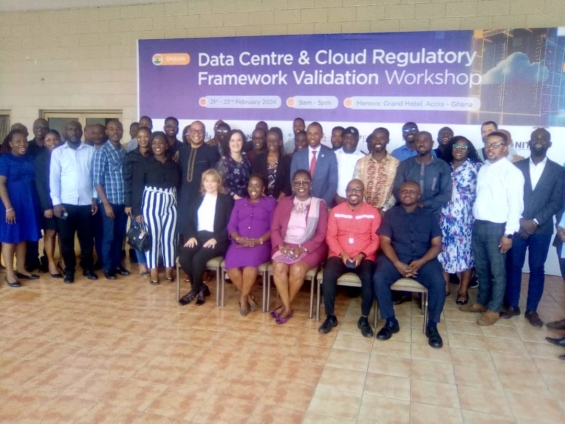Minister of Communications and Digitalisation, Ursula Owusu-Ekuful, has called on stakeholders in the digital industry to mobilise their efforts to shape the future of the digital landscape of Ghana and Africa as whole.
She said: “We are at a crucial point where our collective efforts will shape the future of our nation's digital landscape and that of Africa as well.”
“In this vein, it is critical that we develop a framework to govern the different types of data we have, that is Data in Transit, Data at Rest and Data in Use, to ensure security and proper storage.”
Mrs Owusu-Ekuful made the call when she opened a two-day National Data Centre and Cloud Computing Regulatory Framework Validation workshop on Wednesday in Accra, which was organised by the National Information Technology Agency (NITA) in collaboration with Smart Africa.
She said; “Ghana over the past few years has accelerated her efforts to digitise its economy,” adding; “We know Ghana we are not bragging … that Ghana is considered one of the countries at the forefront of pushing the digital agenda on the continent.”
She said data is gradually becoming the oxygen that government, businesses, and people in the fourth Industrial Revolution would depend on for survival.

“So, it is crucial that we don’t allow the industry to develop organically, but we need to develop a framework to govern the different types of data that we have,” she said.
The Minister said: “We are at critical times and our collective efforts are needed to shape the future of our nation’s digital landscape and the continent as well; because the learnings from this stakeholders’ engagement will not only go to enrich our regulatory framework but will provide useful pointers to other members of the Smart Africa alliance and the continent as a whole.”
She said the legal regulatory framework has most of the elements needed to support a vibrant and competitive digital growth and that attest to the resilience of the Electronic Transactions Act, which underpins many of the initiatives that were taken as Ghana develop its digital agenda.
“The Government of Ghana has also invested in infrastructural development, connectivity, data centres, digital payment infrastructure, company identity systems, electronic IDs, security infrastructure, among others, to support the country’s digital economy,” she said.
Ms Thelma Efua Quaye, Director – Digital Infrastructure, Skills and Empowerment of Smart Africa said one of the primary obstacles that Africa faced is the lack of harmonized regulations across the continent.
“Data knows no borders, and users expect seamless access to their content regardless of geographical location, he said, stating that; “This poses a significant challenge for investors and service providers in the data centre and cloud space, as they seek clarity and consistency in regulatory frameworks.
Ms Quaye said to address the challenge, Smart Africa adopted a phased approach, starting at the national level, to support our member states for the development of national regulatory frameworks for data centres and cloud computing services.
“In collaboration with our member states and stakeholders, we aim to expand these regulations into a harmonized framework that spans the entire continent, facilitating investment and innovation while safeguarding data protection and security,” she stated.
Mr Richard Okyere-Fosu, the Director General of NITA in a welcoming speech read for him said, the Agency this year would roll out several specific regulations to address specific areas in the ICT space.
He mentioned primary objectives to improve the quality of service provided by service providers, align Ghana’s ecosystem to international standards to make it more competitive at the global level, and to protect consumers.
Mr Okyere-Fosu said the programmes would be undertaken in partnership with Smart Africa who was also on a quest to harmonize the digital ecosystem across Africa under the auspices of African Union to put together this regulatory framework for the commercial Data Centres and Cloud Infrastructure in Ghana.
He assured all stakeholders, especially the service providers that the Agency is mindful of their concerns not to overburden their businesses, saying; “Our approach to regulating the ICT sector is not a profit oriented one, but one that will enable and stimulate the market ensuring that the business base and opportunities will be expanded.
“This will then provide the nation with the needed infrastructure required to sustain our digital revolution.”
Latest Stories
-
Ghana Hajj Board confirms death of seven pilgrims in 2025 pilgrimage
35 minutes -
Both governments are responsible for contributing to the country’s energy insecurity through financial debt
42 minutes -
Israel is accused of the gravest war crimes – how governments respond could haunt them for years to come
2 hours -
Liberia’s ex-speaker charged with arson over parliament fire
3 hours -
Help protect oceans for sustainable future – Dr. Agyekumhene
4 hours -
Portugal vs Spain Nations League final preview
4 hours -
Trump-Musk row fuels ‘biggest crisis ever’ at Nasa
5 hours -
Sir Sam Jonah’s blueprint: 10 keys to transform Ghanaian youth into nation builders
5 hours -
Sir Sam Jonah calls for urgent STEM prioritisation to develop Ghana
5 hours -
Gyakie makes Forbes Africa’s 30 Under 30 list for 2025
6 hours -
7 Ghanaian pilgrims confirmed dead during 2025 Hajj
6 hours -
‘Write for World’ graduates 30 females in entrepreneurship and fashion design programme
8 hours -
Police escort vehicle somersaults in near-fatal crash near Binduri
8 hours -
Sir Sam Jonah commends Mahama as he backs youth leadership to transform Ghana
8 hours -
OSP vs Ofori-Atta: It is difficult to reconcile the letters from Mayo Clinic – Neurosurgeon
9 hours

